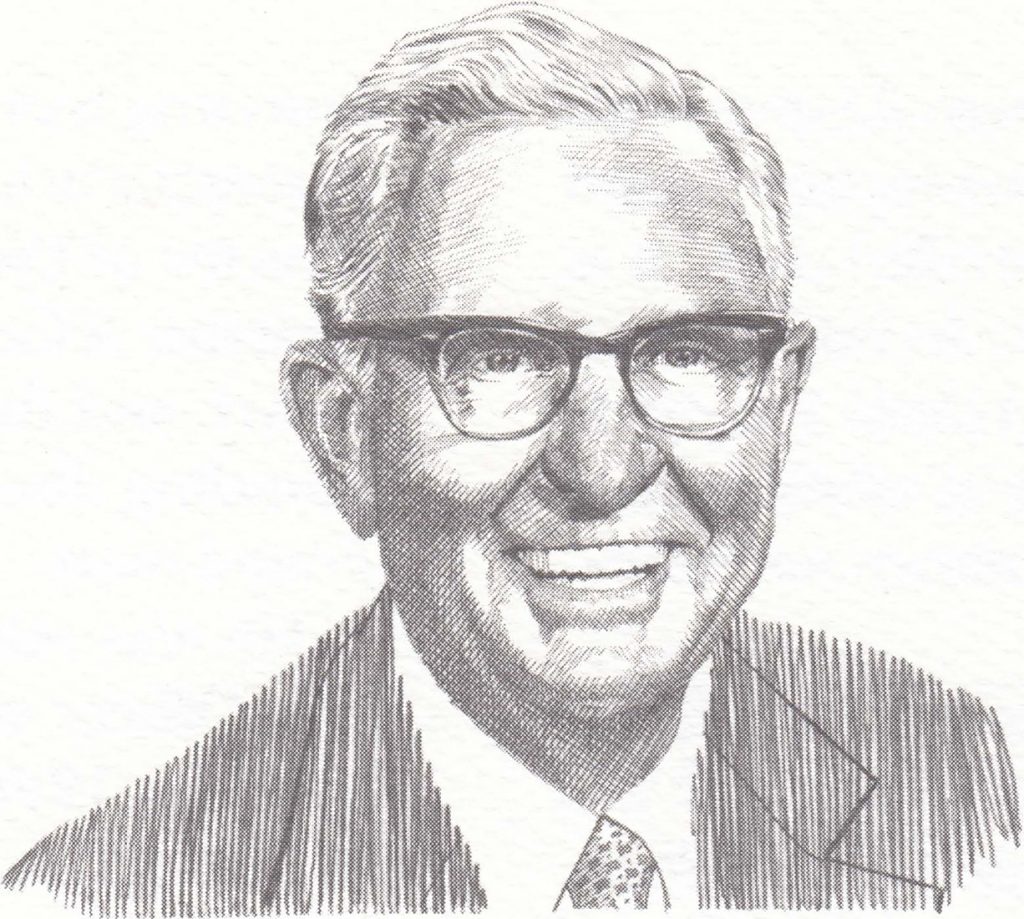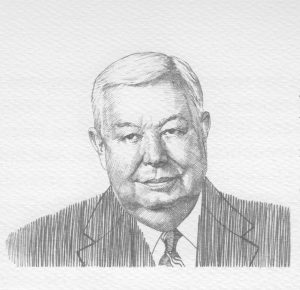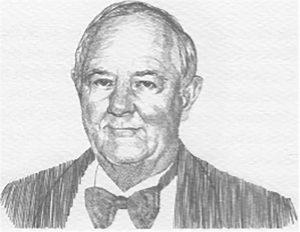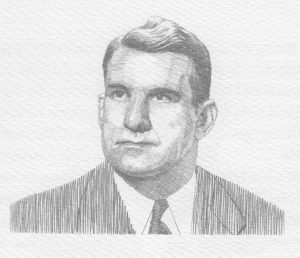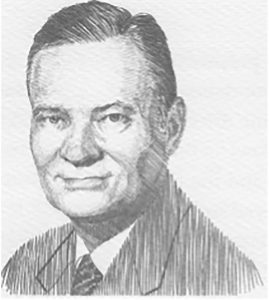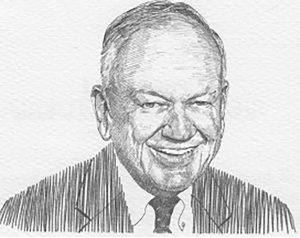Every day scores of young golfers, many of them students at The University of Alabama, tee off at the Harry Pritchett Golf Course in east Tuscaloosa. But few of them realize the legacy and the golfing prowess of the man for whom the course is named. But make no mistake; Harry H. Pritchett was a man of high accomplishment, both in the business world and in the golfing community.
Harry Houghton Pritchett was born June 28, 1909, in Montgomery, where his mother, Kate Louise Powers Pritchett, was temporarily living after the sudden and untimely death of his father, Edward Hill Pritchett. Mrs. Pritchett returned to Tuscaloosa shortly after his birth and Pritchett attended Tuscaloosa schools.
Pritchett began playing golf at the age of 12. At The University of Alabama, where he graduated with a Bachelor of Arts degree in chemistry in 1930, Pritchett was one of the top golfers in the South and in the old Southern Conference, playing four years with the Crimson Tide varsity golf team. He won the Southern Intercollegiate title in 1928 and went on to win the Alabama Amateur title twice. Later in his career, he was the Alabama Senior Golf tournament champion and won the medal for low score in the Southern Amateur tournament. He played in the United States Amateur Championship twice. He was a formidable competitor and a supreme shot-maker who struck his irons with marksman-like accuracy.
“I’ll tell you something,” Pritchett once told a newspaper reporter. “I haven’t meant much to golf, but golf has meant the world to me. I have met some truly wonderful people thanks to this game.”
In fact, he credited golf for helping him land his first post-college job, as a chemist with T.J. Moss Tie Company, a creosote fire, in Columbus, Mississippi at $85 a month. He was playing golf one afternoon in Tuscaloosa and mentioned to a fellow player that he was looking for work. The other player needed a chemist and Pritchett was hired on the spot.
Pritchett left Columbus and moved to Maplesville where he was engaged in the lumber business. After a major fire at the mill and the complete loss by fire of the apartment where he lived with his new bride, Margaret (Sis) Partlow, he sold his interest in the business and moved back to Tuscaloosa, where he began a long and lucrative career in real estate and insurance in 1936. He opened Pritchett Insurance Company and in 1940 was joined by Marlin Moore. The business later became Pritchett-Moore, Inc., a real estate, and insurance company that is a Tuscaloosa landmark. Later he was a founding partner and secretary-treasurer of Creative Displays, Inc. of Tuscaloosa.
A Pritchett friend, Harvey Edwards, Sr., said his friend was “never short on doing all he could in civic matters. Always he was ready and willing and did an able job at whatever he undertook. He did a great many things under difficulties.”
For more than 40 years, Pritchett helped mold many of the institutions of Tuscaloosa. He served on the City Board of Education for 30 years, helping to lead the city school system and The University of Alabama through the integration crisis of the 1960s with moral courage and dignity.
Morris Sokol, a fellow civic leader who served with Pritchett on many civic boards and projects, said at Pritchett’s death: “He is one of the outstanding persons I have ever known. He was talented and not only gave, but he worked for everything good for the community and its people.”
Sokol recalled Pritchett’s leadership role during the integration crisis. “He was moving out front, telling everybody what his feelings and his ideals were when so very many were afraid to open their mouths about it.” Pritchett appeared on national television asking local community leaders to practice restraint and abide by the law.
He also headed the Tuscaloosa Chamber of Commerce and other civic organizations during the post-war development explosion. His professional activities included serving as president of the Alabama Association of Mutual Insurance Agencies and of the Alabama Real Estate Association, which named him Realtor of the Year. He organized and served as the first president of the Tuscaloosa Board of Realtors.
In 1949 he was named Citizen of the Year in Tuscaloosa. He was a past president of the Junior Chamber of Commerce and of the United Way of Tuscaloosa County. He was a member of the boards of directors of Alabama Gas Corporation, the First National Bank of Tuskaloosa, and the Alabama Chamber of Commerce.
In 1965 Pritchett received the Algernon Sydney Sullivan Award for service to The University. He was a member of the president’s cabinet of the University and was awarded an honorary doctor of laws degree in 1979 and the Liberty Bell Law Award in 1981.
He headed the fundraising campaign to build the University Law Center. In 1979 the University of Alabama National Alumni Association named him distinguished alumnus of the year.
In 1978, the Board of Trustees of The University of Alabama System approved naming the university golf course in his honor and a resolution confirming the honor was approved by the state Legislature. He repaid the game he loved by serving as president of the Alabama Golf Association, the Southern Golf Association, and the Alabama Senior Golf Association.
Pritchett was an active and longtime supporter of historic preservation efforts, and served on the Alabama Sesquicentennial Commission in 1969, as co-chairman of the Tuscaloosa County Bicentennial Commission and as a member of the Heritage Commission of Tuscaloosa County.
Pritchett was married to the former Margaret (Sis) Partlow, whom he met at Sunday School at the First Methodist Church. They were high school sweethearts and married shortly after college. They had four children: the Very Reverend Harry H. Pritchett, Jr., Dean of the Cathedral of St. John the Divine in New York City; Mrs. Margaret “Boo” Privett of Palm Beach Gardens, Florida; Mrs. Katie Mitchell of Decatur, Alabama, and Mrs. Kathleen “Kat” Quarles, of Tuscaloosa. All are graduates of The University of Alabama. The Pritchetts were members of Christ Episcopal Church where he served on the Vestry and as senior warden for several years.
Pritchett was a longtime member of Indian Hills Country Club, and he developed his game at the nine-hole Riverside Course in Tuscaloosa and at Tuscaloosa Country Club. At Indian Hills, he was a member of a golfing group facetiously called “The Gangsters.” Shortly after Pritchett’s death in 1981, a fellow golfer told The Tuscaloosa News, “When you open up the rules book to that page where it talks about golf being a gentleman’s game, that’s where you’ll find Harry Pritchett’ s name.” A gentleman on the golf course and a gentleman of the business community.

